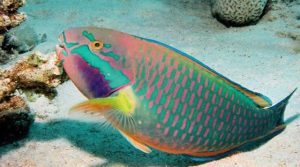V I Free Press
CHARLOTTE AMALIE — A St. Thomas diver is calling on local fishermen to stop catching parrotfish for people to eat here, saying the fish’s daily behavior promotes healthy coral growth.
Eladio Camacho of St. Thomas wrote a post on Facebook on Tuesday morning saying that “PARROTFISH ARE IMPORTANT!”
“I feel sorry for the parrotfishes! Yes, this fish can be eaten, but for us divers this is a big No-No!” Camacho said. “There are important reasons why we should not eat them and we should educate the fishermen to stop catching these beautiful fish! Please do spare them … the ocean needs them to regenerate. They’re lots of fish you can catch in the sea. They can sell and cook the other fish, but leave the parrotfish!”
 Parrotfish play an increasingly important role in tropical reef ecosystems which suffer the depletion in the reduction of coral cover. Parrotfish maintain coral reefs by consuming and removing macroalgae, which otherwise would cover the reef, causing it to become unhealthy and hindering it from growth.
Parrotfish play an increasingly important role in tropical reef ecosystems which suffer the depletion in the reduction of coral cover. Parrotfish maintain coral reefs by consuming and removing macroalgae, which otherwise would cover the reef, causing it to become unhealthy and hindering it from growth.
According to a 2012 study, the loss of parrotfish disturbs the delicate balance of coral ecosystems and allows algae, on which they feed, to smother the reefs.
Camacho agreed, offering his own sources on Facebook, and encouraging people to copy and paste the information.
“Parrotfish eat algae and dead coral. They spend up to 90 percent of their day nibbling. In other words, they clean the reef. This is important because most of the reefs across the tropics are being smothered by algae because there are not enough parrotfish and other herbivores out there grazing.
After all that eating, get this: They poop fine white sandlots of it! Each parrotfish produces up to 700 pounds of sand each year.

Their numbers are so depleted, and algae levels are so high, that they cannot be fished sustainably right now anywhere in the Caribbean. These flamboyant, algae-eating, sand-pooping fish need to be left in the water. And when they are left to chomp away, they do a brilliant job. A massive new report concludes that reefs, where parrotfish were abundant in the 1980s, are the reefs that are healthy now.”
That’s why Camacho said local fishermen should lay off the parrotfish.
But one local fisherman disagreed with him on Facebook.
“Very true but also to tell people not to buy the fish is wrong,” E.J. Martin, Jr. said. “As a fisherman I can tell you that there are many types of parrotfish, of which only a few are actually caught and kept for sale. If you want to go about it right then regulate and enforce.”
Still, Camacho could not be dissuaded from his argument in favor of conservation.
“There is a reason for their existence so please let’s not eat them,” Camacho said. “To our government, please educate our fishermen. Say ‘no’ to catching parrotfish! Let’s not buy parrotfish, so they won’t catch them anymore.”
